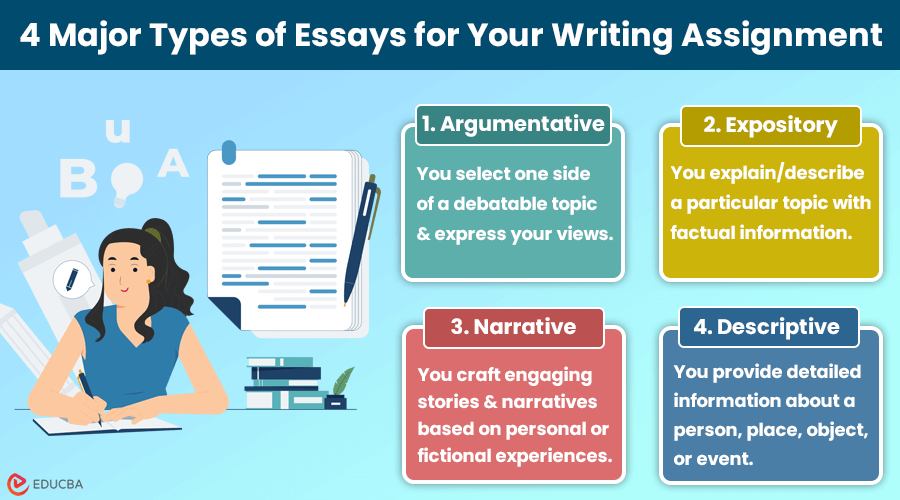
Overview of Types of Essays
Writing a valuable and impactful essay can feel like a difficult battle. Even students spend sleepless nights working on essays that barely earn a B or, sometimes, a passing grade.
The importance of essays is that they allow you to communicate with others, expressing ideas, arguments, narratives, and scientific research through thesis and other explorations. Essays can be of varying lengths. Short-form essays are usually 500-700 words, and they often do not go too deep into the subject, or they might only cover certain portions of the wider subject. Another kind is long-form essays, which usually last more than 1000 words and can certainly reach up to 5000 words. When they are too long, they become a research paper.
That’s why you need to plan well and devise better strategies to ensure that your work is well-structured. One of the best strategies is to choose the right paper type and find a perfect essay writing service, like an essay writer UK, for your assignment. In this post, you will learn about different categories of essays and key considerations for choosing the correct essay type.
Table of Contents
Types of Essay
An essay usually allows you to express yourself uniquely. You decide how to express your topic and what perspective or content to use. The following are different categories of essays that you can consider for a writing assignment.
1. Argumentative
In an argumentative essay, you select one side of a debatable topic and express your views. In this type of essay, your arguments or opinions are based on evidence, facts, statistics, and logical reasoning to support your opinions. You can also address opposing viewpoints.
The first step in writing this type of essay is to build a solid statement or theory (thesis) as your opening argument. With the thesis, you state your main point and what you intend to prove. Throughout the essay, you will use logic and persuasion to convince your reader, just as a lawyer uses powerful arguments to sway the jury.
2. Expository
In contrast to argumentative essays, expository essays explain or describe a particular topic by sharing factual information. This essay will not contain personal opinions; it provides clear explanations and breakdowns and interprets complicated topics in an understandable way.
3. Narrative
Narrative essays are all about telling stories. You can craft engaging narratives based on personal or fictional experiences. The main focus is building an emotional connection with readers using creativity and a well-structured storyline.
The best narrative essays focus on personal life because they allow you to express yourself and make readers feel connected to you.
4. Descriptive
A descriptive essay focuses on describing a person, place, object, or event. The formula for writing a successful descriptive essay is transforming ordinary scenes into extraordinary experiences. It allows the reader to picture or image an event or place clearly in their mind.
Key Considerations for Choosing the Right Types of Essay
Before writing an essay, consider the key factors below to choose the most appropriate essay type.
1. Relevance and Interest
Choose something that you are passionate about. It will make the writing part easier because you can dive deeper into the research and approach your assignment with some enthusiasm. Moreover, you can also add a fresh dose of perspective and authenticity to your writing.
2. Feasibility
Some writing is ambitious, but it is always best to consider how much time, resources, and other knowledge you will need to complete your writing project. A well-developed and focused essay of 1000 words is better than a 3000-word essay with improper structure and information.
3. Audience and Purpose
Always have the audience in mind, i.e., who will be reading your essay. If you write an article for a student magazine that aims to stir up debate, ensure you correctly provide your arguments and facts. Also, consider your target readers’ subject-matter knowledge and how enthusiastic they would be to read your essay.
4. Personal Strengths
Everyone has different writing strengths. You may be great at crafting stories that engage readers, or you might be good at doing in-depth research and filling your writing with figures and facts. So, focus on your strengths. This will help you deliver compelling and impactful essays that leave a lasting impression on your audience.
Final Thoughts
Finally, you might have understood the different types of essays and the key factors to consider when choosing them. These will help you improve your essay-writing skills.
Frequently Asked Questions (FAQs)
Q1. How do I ensure that the topic I have chosen fits my essay assignment?
Answer: You can read the assignment’s instructions carefully and identify the keywords or topic. These keywords will help you determine the essay type and overall objectives, like whether the topic requirement or purpose is an argument, explanation, narration, entertainment, or description. If you are a student, ask your instructor to clarify more on what they expect from certain essay types.
Q2. How do you decide the right “personal strengths” while selecting essays?
Answer: When selecting essay topics and types, consider your area of interest, skills, and knowledge. For example, if you enjoy logical reasoning and debate, argumentative essays might be a good fit. If you have a talent for storytelling, consider exploring narrative essays.
Q3. Can I combine elements of different essay types in a single assignment?
Answer: It depends on your instructor and the purpose of your writing. If the purpose is clear, like persuading someone, then you can stick to one type. However, your instructor can allow flexibility to bring out the best in your writing style. For example, you can use a personal topic to narrate your stories, describe a particular topic, and also provide your point of view.
Recommended Articles
We hope that this article on “Types of Essay” was beneficial to you. To learn more about related topics, refer to the articles below.
